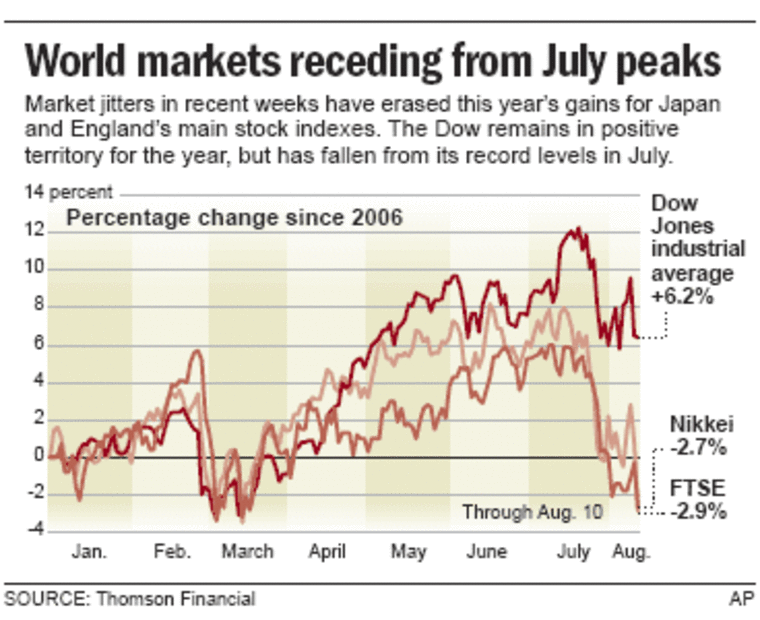Central banks around the world injected more cash into the international banking system Friday as problems that began with U.S. subprime mortgages rattle the global economy.
The ECB injected a further 61 billion euros ($83.8 billion) Friday morning, while the U.S. Federal Reserve later announced a three-day repurchase agreement to inject liquidity into the market.
The Fed said it would accept $19 billion in mortgage-backed securities after its Fed Funds rate, the rate that banks charge each other for overnight loans, ticked above 6 percent — well above the Fed’s target of 5.25 percent.
Later, the U.S. central bank said it would pump as much money as needed into the U.S. financial system to help overcome the effects of a spreading credit crunch.
The moves did little to mollify world markets, with major indexes falling from Tokyo to London.
The ECB had already provided 95 billion euros ($130.7 billion) in funds to banks on Thursday, while the Fed added $24 billion and Japan’s central bank injected 1 trillion yen ($8.4 billion) into money markets.
It was the first time the U.S., European and Japanese central banks had taken such action together since the aftermath of the Sept. 11 terrorist attacks. The Australian, Hong Kong and Canadian central banks also joined in.

The ECB said Friday its move “aims to assure orderly conditions in the euro money market” and it pledged to keep close tabs on the situation.
But edginess in global markets — and concern about non-U.S. companies’ exposure — was reflected in sharp declines in stock indices around the world on Friday. London’s FTSE 100 dropped 3.2 percent, the CAC-40 in Paris fell 3.3 percent and Germany’s DAX index was down 1.5 percent.
“Market concerns about the U.S. subprime crisis are continuing without any apparent respite,” said Joerg Kraemer, chief economist at Commerzbank AG in Frankfurt.
Some analysts argued that the ECB — which sets monetary policy for Germany, France and 11 other EU nations — was taking a risk with the infusion as it could itself create a crisis in confidence.
“The ECB was correct to shore up banks’ balance sheets, but its high-profile announcement likely did more to scare markets than calm them,” said Peter Morici, an economics professor at the University of Maryland.
“Banks are calling in notes from hedge funds and denying private equity funds new loans for questionable investments,” Morici said. “It’s a modern-day run on the bank.”
Defaults on subprime loans — those made to people with poor credit — have climbed sharply in the United States in recent months and have triggered concern about the impact on credit markets worldwide. Until the past few weeks, most of the banks and companies affected were in the U.S.
But in Germany, insurer Allianz SE, which owns Dresdner Bank AG, revealed Friday that it has 1.7 billion euros ($2.3 billion) of exposure to the U.S. subprime market — or about 0.16 percent of its 1.03 euros trillion ($1.41 trillion) in total investments.
Deutsche Bank AG also said Friday that DWS Investments, its investment arm, would keep its asset-backed securities WDS ABS Fund open, even though it has lost 30 percent of its value, or 2.1 billion euros ($2.9 billion) since July. It said it would keep the fund open at the request of its mostly institutional investors, noting that it is not invested in U.S. subprime loans.
Earlier this week, WestLB Mellon Asset Management, the asset management joint venture of German state bank WestLB AG and The Bank of New York Mellon Corp., suspended redemptions from its asset-backed securities ABS Fund.
Other companies, including Union Investment Asset Management, a German mutual fund manager, and Frankfurt Trust, a unit of BHF-Bank, have also halted redemptions.
A pool of German banks stepped in this week to shield IKB Industriebank AG from further losses after the lender’s Rhinleland Funding Capital Corp. bought 14 billion euros ($19.11 billion) in fixed-income securities — some of them backed by subprime mortgages. The bank’s chief executive and chief financial officer have both resigned.
The worries came to a head Thursday after French bank BNP Paribas SA announced the suspension of three asset-backed securities funds, saying it could not value them accurately. The ECB announced its first move after that.